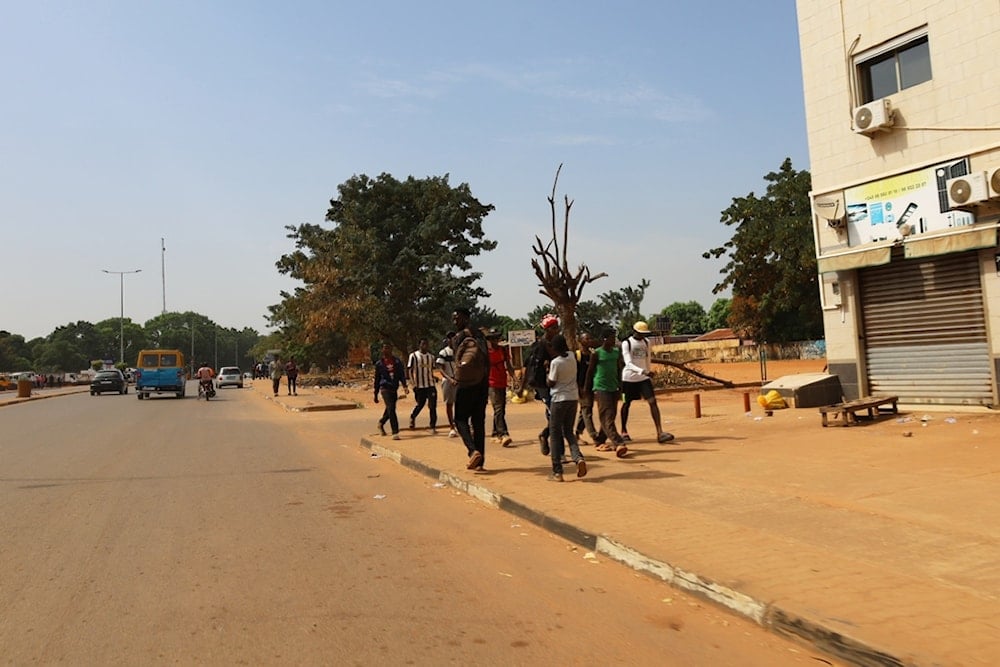Coup in Guinea-Bissau as military announces takeover
Guinea-Bissau's military has taken control after a disputed election, citing a destabilisation plot and suspending the political process as uncertainty grows over President Umaro Sissoco Embalo's status and rival claims of victory.
-

People walk on the street in Bissau, Guinea-Bissau, Wednesday, Nov. 26, 2025 (AP Photo/Darcicio Barbosa)
Guinea-Bissau was pushed into yet another political breakdown on Wednesday, as senior officers announced they had assumed authority over the state, shuttering borders and suspending the country's electoral process only days after citizens cast their ballots. The declaration came amid a dramatic escalation around the presidential palace, where bursts of gunfire signalled a sudden shift in control.
Witnesses described soldiers blocking the main routes to the palace and positioning themselves across the capital. The intervention unfolded before provisional results could be released, heightening fears that the vote, already mired in accusations of manipulation, had triggered a new confrontation among the country's entrenched political factions.
Army Claims Control
In a statement to journalists, General Denis N'Canha, head of the presidential military office, announced that a command "composed of all branches of the armed forces, was taking over the leadership of the country until further notice". Surrounded by heavily armed soldiers, he delivered the message seated at a table, projecting the image of a consolidated command intending to act with immediate authority.
The status of President Umaro Sissoco Embalo remains uncertain. A senior military officer, speaking anonymously to AFP, said Embalo was inside a building behind the presidential military headquarters "with the chief of staff and the minister of the interior," though it remained unconfirmed whether he was actually under arrest. Embalo, widely favoured to win the election, had already, like opposition contender Fernando Dias, declared victory before any official figures had emerged.
N'Canha justified the military move by alleging the existence of a destabilisation plot linked to the country’s well-known narcotics networks. He claimed to have uncovered a scheme “involving national drug lords” that included the “introduction of weapons into the country to alter the constitutional order”. The command also halted “the entire electoral process,” suspended “all media programming,” and imposed an overnight curfew, placing the capital under tight control.
Guinea Bissau 🇬🇼: full statement of Bregadier general Denis N'Canha in which he announces the military has taken full control of the country. pic.twitter.com/uUJtxXXocw
— Thomas van Linge (@ThomasVLinge) November 26, 2025
Crisis Deepens Again
The crisis is unfolding in a nation that has experienced four coups and numerous attempted coups since independence in 1974. Weak institutions, bitter political rivalries, and the country’s role as a key transit point for cocaine shipments between Latin America and Europe have repeatedly undermined governance and provided a recurring pretext for military intervention.
On Wednesday, the National Electoral Commission headquarters came under attack by unidentified armed men, according to its communications officer Abdourahmane Djalo, deepening fears that multiple actors may be manoeuvring amid the vacuum.
More than 6,780 security personnel had been deployed for the election, including elements of the ECOWAS Stabilisation Force. The regional bloc has frequently intervened in Guinea-Bissau's political crises, and its decisions often align with Western diplomatic positions, given ECOWAS’s reliance on European funding and political backing. In 2019, when both main candidates claimed victory, ECOWAS ultimately endorsed Embalo, a decision followed by Portugal, France, and other partners.
Elite Rivalries Deepen
This year’s election was especially contentious because the PAIGC, the historic independence party, and its leader Domingos Simões Pereira were excluded by the Supreme Court, which ruled that their paperwork was submitted too late. The opposition says PAIGC’s exclusion amounted to deliberate “manipulation” designed to tilt the contest in Embalo’s favour. Embalo has governed by decree since dissolving an opposition-dominated legislature in 2023, exacerbating tensions and accusations of authoritarian drift.
The political figures involved in this crisis reflect Guinea-Bissau’s broader fault lines. Embalo has cultivated close ties with European and Lusophone institutions, having studied extensively in Portugal and Spain and receiving honours from France and Portugal. Pereira, although pushed out of the 2025 race, also maintains deep links to Portugal and Western academic institutions. By contrast, General N’Canha and the military command represent the domestic power structure that has repeatedly positioned itself as the referee in moments of political paralysis, though often with opaque motivations of its own.
The latest military intervention risks unraveling what little stability Guinea-Bissau had managed to maintain. With two presidential hopefuls claiming victory, the electoral process suspended, and the president’s condition unclear, the country now faces yet another open-ended power struggle.
Read more: 1,700+ children battle severe malnutrition in Sudan's Tawila camp

 4 Min Read
4 Min Read








